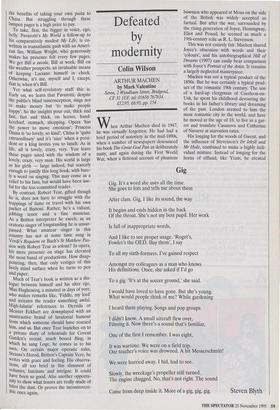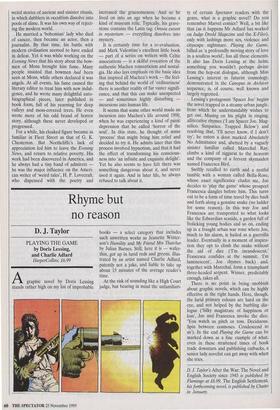Defeated by modernity
Colin Wilson
ARTHUR MACHEN by Mark Valentine Seren, 2 Wyndham Street, Bridgend, CF 31 lEF, tel: 01656 767834, £12.95, £6.95, pp. 154 When Arthur Machen died in 1947, he was virtually forgotten. He had had a brief period of notoriety in the mid-1890s, when a number of newspapers denounced his book The Great God Pan as deliberately nasty, and again during the First World War, when a fictional account of phantom bowmen who appeared at Mons on the side of the British was widely accepted as factual. But after the war, surrounded by the rising generation of Joyce, Hemingway, Eliot and Pound, he seemed as much a 19th-century relic as R. L. Stevenson.
This was not entirely fair. Machen shared Joyce's obsession with words and their 'colours', and his autobiographical Hill of Dreams (1907) can easily bear comparison with Joyce's Portrait of the Artist. It remains a largely neglected masterpiece.
Machen was not a typical product of the 1890s. But he was certainly a typical prod- uct of the romantic 19th century. The son of a hard-up clergyman of Caerleon-on- Usk, he spent his childhood devouring the books in his father's library and dreaming of the past. London seemed to him the most romantic city in the world, and here he moved at the age of 18, to live in a gar- ret and translate Casanova and Catherine of Navarre at starvation rates.
His longing for the woods of Gwent, and the influence of Stevenson's Dr Jekyll and Mr Hyde, combined to make a highly indi- vidual mixture. Instead of longing for the horns of elfland, like Yeats, he created weird stories of ancient and sinister rituals, in which dabblers in occultism dissolve into pools of slime. It was his own way of reject- ing the modern world.
He married a 'bohemian' lady who died of cancer, then became an actor, then a journalist. By that time, his battle with modern civilisation seemed to have ended in defeat. Yet it was while working on the Evening News that his story about the bow- men of Mons brought him fame. Many people insisted that bowmen had been seen at Mons, while others declared it was angels. At all events, his fame caused the literary editor to treat him with new indul- gence, and he wrote many delightful auto- biographical pieces, later published in book form, full of his yearning for deep valleys and moss-covered trees. He even wrote more of his odd brand of horror story, although these never developed or progressed.
For a while, his cloaked figure became as familiar in Fleet Street as that of G. K. Chesterton. But Northcliffe's lack of appreciation led him to leave the Evening News, and return to relative poverty. His work had been discovered in America, and he always had a tiny band of admirers — he was the major influence on the Ameri- can writer of 'weird tales', H. P. Lovecraft, who dispensed with the poetry and increased the gruesomeness. And so he lived on into an age when he became a kind of museum relic. Typically, his grave- stone contains the Latin tag: Omnia exeunt in mysterium — everything dissolves into mystery.
It is certainly time for a re-evaluation, and Mark Valentine's excellent little book — part of a series on writers with Celtic associations — is a skilful evocation of the authentic Machen romanticism and nostal- gia. He also lays emphasis on the basic idea that inspired all Machen's work — the feel- ing that behind the world of 'ordinariness' there is another reality of far vaster signifi- cance, and that this can make unexpected — and sometimes highly disturbing incursions into human life.
It seems that some other world made an incursion into Machen's life around 1900, when he was experiencing a kind of panic depression that he called 'horror of the soul'. In this state, he thought of some `process' that might bring him relief and decided to try it. He admits later that this process involved hypnotism, and that it had the effect of transforming his conscious- ness into 'an infinite and exquisite delight'. Yet he also seems to have felt there was something dangerous about it, and never used it again. And in later life, he always refused to talk about it.



















































































 Previous page
Previous page